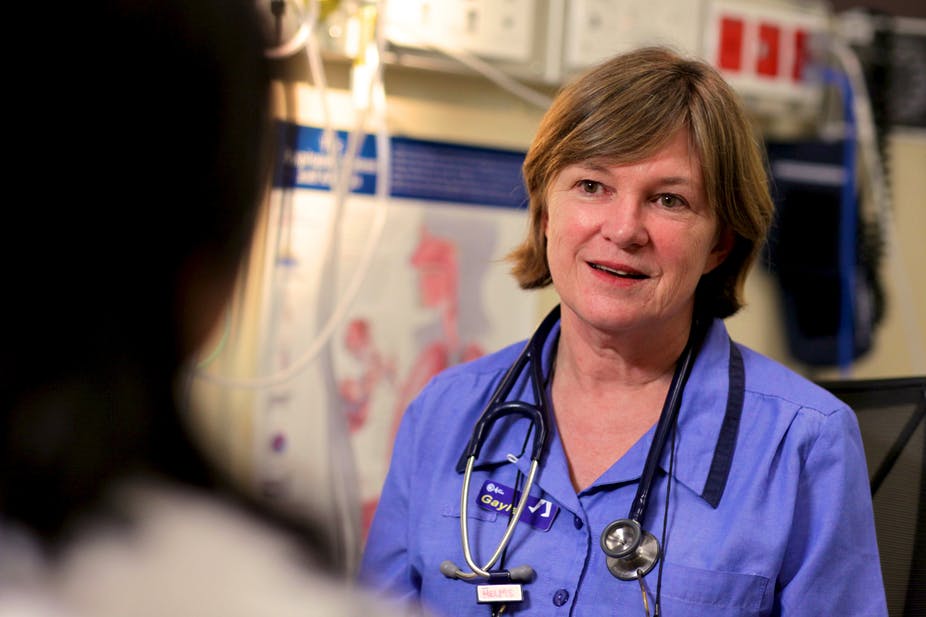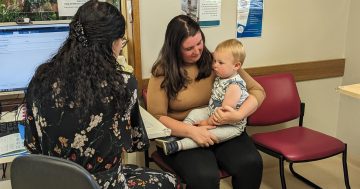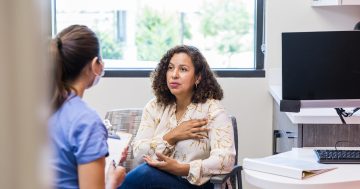
Photo: DIAC (Creative Commons).
Whether you’ve made a New Year’s resolution to look after your health, or you resolve every day to try and take better care of your body, there is no time like the present to make a list of things – many of them quick, easy, and cheap or free – that can make a big difference to your health. While this is aimed at women, because the Women’s Centre for Health Matters focus on issues affecting women in the ACT, many of these things apply to everyone.
Having an annual GP check-up is actually a good idea. If you are on a low income, look for a doctor that bulk bills. Some GPs will bulk bill people with a Healthcare Card or on the Age Pension. National Health Co-op bulk bill once you’re a member, with membership discounted by 50 per cent for Commonwealth concession card holders. Or use the Advanced Search function on Capital Health Network’s find-a-health-service tool to find bulk billing doctors that meet your needs.
ACT Women’s Health Service is a good place to access women-centred care for women who have significant difficulty accessing health services due to the impact of:
- Violence, abuse or neglect;
- Identifying as being of Aboriginal or Torres Strait Islander origin;
- Language or cultural barriers;
- Homelessness or risk of homelessness;
- Substance abuse issues;
- Mental health issues;
- Disability; or
- Sexual identity issues.
When you see the GP, ask them to check:
- Blood pressure;
- Blood glucose levels – check for diabetes every 3 years once you turn 40;
- Cholesterol – every 5 years after 45 years old;
- Bowel cancer screening – every 2 years once you turn 50, earlier if you have a family history. The National Bowel Cancer Screening Program should send you a kit based on your age, but you can ask your GP if you’ve not received one and think you should have.
- Breast screening – every 2 years once you turn 50, earlier if you have a family history. BreastScreen ACT is free for women over 40 years and living in the ACT.
- Urinary test for kidney health – annually;
- Cervical screening –once every 5 years starting at 25 years old until you are 75 years old.
Once you are over 60 years old, you might also need blood tests for vitamin D and B12 and a bone health scan for osteoporosis. You can also consider getting a hearing check done, and ask your doctor about the invasive pneumococcal vaccine for over 65’s to prevent meningitis, pneumonia, and bacteraemia.
Sexually transmitted infections can happen to people of all ages. So if you’re sexually active, get checked! You can get this done at your GP, or go to Canberra Sexual Health Centre (free, and no appointment necessary) or Sexual Health and Family Planning ACT. While you’re there, get an update on contraception options. There may be something that is better suited to your current lifestyle than what you’ve been using – especially if you’ve not been using anything!
Dental health checks should be done regularly, between once every six months and once every two years depending on your individual risk profile. For people who have a Pension Concession Card or Healthcare Card, ACT Health dental services provide treatment with a maximum co-payment for restorative treatment of $300 per year (excluding molar endodontics, general anaesthetic, and dentures).
Eye tests should be done once every two years, or more often if you are at higher risk or already have a vision issue. Many optometrists bulk bill eye exams for Medicare card holders.
If you weren’t vaccinated as a child, it’s not too late! Ask your GP what vaccinations are relevant to you. It’s also worth asking about vaccination for hepatitis B, herpes-zoster (if you’ve had chicken pox, you can get painful shingles later in life), and HPV (human papillomavirus) if you’re not yet sexually active.
Made a New Year’s resolution to have a baby? Talk to your GP about whooping cough and rubella vaccinations. Start taking a folate supplement, and reduce your alcohol and cigarette use.
Wellbeing every day means a healthy diet, regular physical activity, some regular self-checks, and self-care. Physical activity and healthy eating improve your health regardless of your body size! Body confidence is important for mental health, and it is easier to take care of a body you love.
We should all be doing at least 30 minutes of physical activity every day. That doesn’t mean you need to join an expensive gym. Dancing, using a free outdoor gym at the park, walking or running, or doing yoga at home all count as physical activity. You can incorporate more activity into your day by taking stairs instead of the lift at work, and walking or riding to work or the bus stop. Taking your kids with you when you go for a run or swim is a great way to help them develop good habits – try Parkrun and MEGA. A lounge room disco with young kids is fun, too.
Healthy eating means 2 fruit and 5 vegetable servings daily. As a general guide, half of your plate should be vegetables, one quarter of the plate should be protein, and one quarter starch. Avoid any “diet” that severely restricts any nutrient – it is likely to damage your health. Eat a variety of foods every day, and choose 80 per cent from the healthy foods list and 20 per cent “sometimes foods”. A generally healthy everyday diet is much better in the long term than a detox every January followed by junk food every day for the rest of the year.
Be aware of the energy levels in alcohol drinks. Stick to 2-3 standard drinks on a maximum of 4 days per week, and your body will feel better than a binge on the weekend.
Make sure you get plenty of calcium in your diet for bone health, and enough vitamin D through sun exposure. In Canberra, that means a few minutes a day on most days, and 2-3 hours per week in June and July. If you suspect you’re not getting enough sun exposure, you may need to take a supplement. For bone health, women need 1000/mg of calcium a day, or 1300/mg a day once they’re over 50 years old.
There are self-checks that you should do regularly. Check your skin for changes that might indicate melanoma, and do breast self-checks regularly.
More women than men die from heart attacks in Australia, and the signs for women are different. Look out for fatigue, chest pain or discomfort, sweating, shortness of breath, nausea, pain in the arms or back or jaw, or stomach pain. For women who have already reached menopause, the risk is increased due to hormonal changes in the body.
One good tip to remember is that we should have a feel-good lifestyle. If we’re truly listening to our bodies, they will tell us what feels good: a healthy diet, fun physical activity, fresh air but not too much sun, and dealing with small health problems before they become big ones.





















